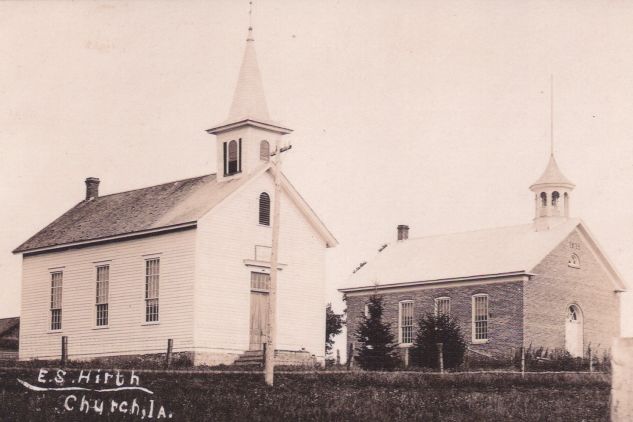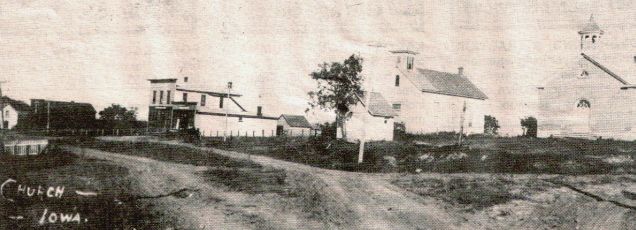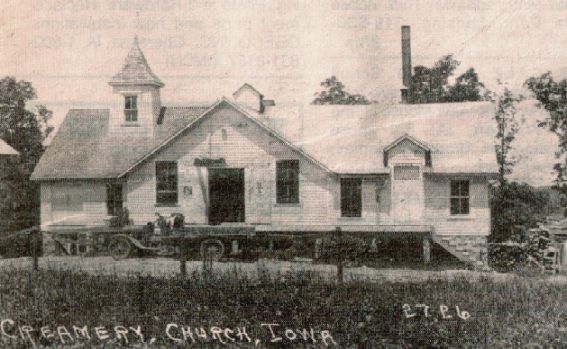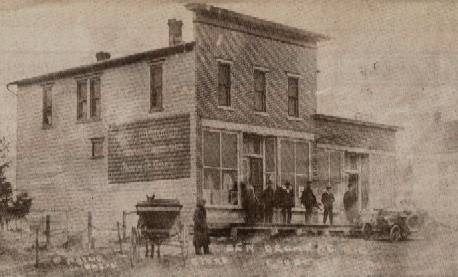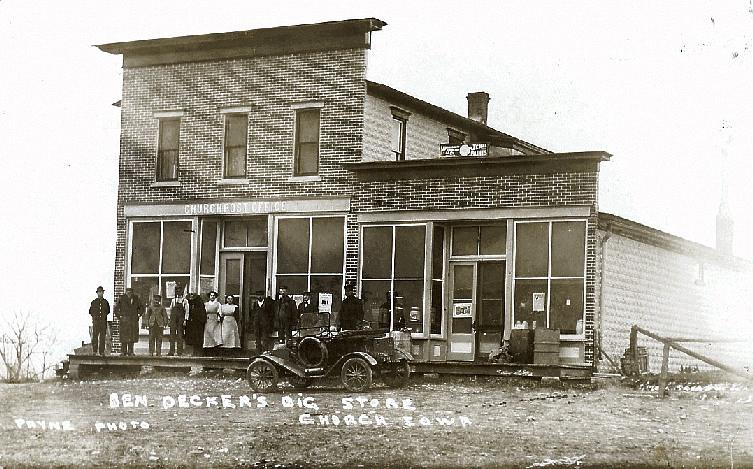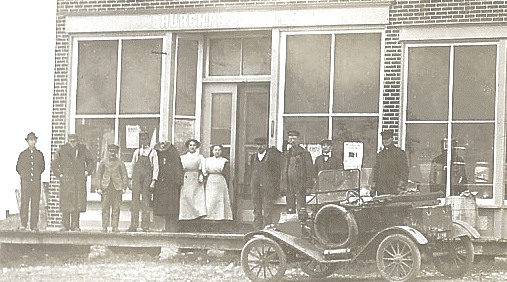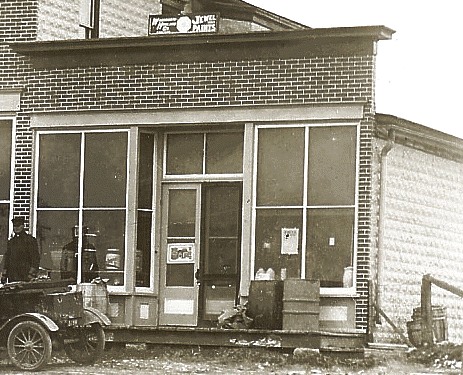Decker's Store, Established 1898
Ma and Pa's Offers Free Trip Backward
in Time
by Elnora J. Robey
Waukon - Customers at Ma and Pa's Country store in
Church on highway 9, ten miles northeast of here, get
a free trip backward in time. In addition to some
unusual items of store equipment still in use, many
of the shelves are stacked with antiques from the
collection of the proprietor, Bernard Zeimet.
When Bernard and Dorothy Zeimet took over operation
of the store in 1970, it was only the second time the
business had changed hands since it was established
in 1898. Members of the Ben Decker family had owned
it since 1903, and the 1970 sale included real
estate, stock, and equipment, excepting for a few
items.
Five pieces of equipment are of particular interest
to visitors. The scale, a product of Computing Scale
Co., Dayton, Ohio, is a real old-timer. "But
it's more accurate than scales made today,"
Dorothy Zeimet said, indicating that inspectors have
tremendous respect for it.
The large brass and wood cash register, made by the
National Cash Register Co., is a handsome machine.
Esther Decker Marti of Church remembers that when her
father bought it, the business required three clerks.
"He bought a till with three drawers so that
each clerk could use his own. Until then, I believe
money was just kept in a box or drawer," Mrs.
Marti said.
Overhead, between scale and cash register at the main
counter, are dispensers for string and for paper
bags. Mrs. Marti also recalls when the string
apparatus arrived. "Before that, we had kept
balls of cordstring in the end of the paper rack. It
was exciting when the Post Toastie people gave us the
string dispenser."
Even people familiar with general stores of 50 years
ago may not have seen a broom holder like that in
Zeimet's store. It is a sturdy black-enameled iron
holder, circular in design, that displays 16 brooms
and keeps them in good shape.
Mrs. Marti recalls another convenience that used to
be in the store - a holder that held buggy whips by
their tips. "It hung from the ceiling. Prices
were on the handle where prospective buyers coud see
them easily. It was just a flat metal holder. My dad
sold it. Someone wanted it, and to him it was just an
old thing he had no use for. He sold it for 50
cents."
A cabinet of drawers which now stands at the end of a
showcase near the back of the store was used by
Decker for notions - shoe strings, hooks and eyes,
buttons, fuses for cars, and violin strings. (How
many violin strings are sold in a rural community
today?)
The whole north side of the store used to display dry
goods. "Gradually people quit buying; material
comes in bolts, and women didn't like to have the
same thing a lot of their neighbors had," Mrs.
Marti explained.
Now Zeimet uses most of that shelving for antiques,
prominent among these being an array of lamps at the
front of the store. He prefers collecting to selling
these articles of metal, wood, glass, and
earthenware, according to his wife. "Some of
them can be useful," she said. "The lard
press and meat grinder on the top shelf were used
only two or three years ago, the lard press for
removing walnut husks. She thought the charcoal iron
might be used without too much trouble.
On one shelf is an array of tin cups similar to those
western threshing crews used to buy by the score. In
Decker's time many items like these would have been
in the hardware half of the building, which is now
mostly a storage area. Reached through a door at the
middle of the south wall, this room has an elevator
to the basement, as well as an entrance to the
stirway to the upstairs apartment where the Zeimets
live.
According to Herman Kerndt, Waukon, who was born two
miles west of Church, the store building is
substantially the same as when George Coppersmith,
member of a family which has been associated with
merchandizing in Dorchester in the northwestern
corner of the county, sold it to Ben Decker. "My
father had a partner at first, you know," said
Mrs. Marti. "It was for only a short time,
though."
Not even Hancock's two-volume 1913 history of the
county mentions this partnership with Charles J.
Riser. In fact, very little is told of Church. An
unplatted settlement, it grew when Isaac Bechtel, who
owned 40 acres at the top of the hill where the
Lansing to Waukon raod finally leaves the valley
about seven miles from Lansing, began selling some
lots. It has remained comparatively stationary at its
present size of a dozen homes.
The German Evangelical Congregational Society of
Lansing Ridge was incorporated Oct. 1868, with
Bechtel as one of the founders. In 1887 a school was
built next to it. These and, later, the Calhoun
Cooperative Creamery were important factors in the
success of Decker's business, which was next to the
church.
"We were open on Sunday mornings and opened at 6
or 6:30 in the morning - it took a while to get the
fires going. At noon and after school children came
to buy knick-knacks or just come," Mrs. Marti
said.
"We began working when we were children
ourselves. I loved it. The post office was in the
northeast corner - the area is still partitioned
waisthigh - and the telephone switchboard was in the
southeast corner. We had a bell upstairs for night
calls. Sometimes the switchboard girl stayed with
us."
"Eventually we moved to the big white house
across the road. My mother wanted to get us away from
the store. People would tease us, and we got so we
talked back. My mother never worked in the store. She
like her home and like to sew and crochet."
"In early days farmers brought their own cream
to the creamery. That brought people to town. Besides
that, my father bough a lot of produce - eggs,
chickens, turkeys, even wool. I remember there'd be
several people dressing poultry. We were especially
busy before Thanksgiving. We packed dressed poultry
in cartons or barrels and took them to Lansing to be
shipped by train, mostly to Chicago."
Mr. Kerndt remembered taking eggs and poultry to sell
at Decker's. "We did most of our trading there,
groceries mostly - in those days we raised most of
our livestock feed ourselves. The store used to be
open Sunday mornings. Sometimes we'd drive up with
the horses in the evening."
After Ben Decker died in 1963 at the age of 85, Mrs.
Marti and her mother took over the store. Mrs. Marti
had previously worked in it at various times,
particularly the two years after she finished high
school before she began teaching and again after her
husband's death.
Mrs. Zeimet takes care of the store most of the time,
since her husband has been working in southern Iowa
on construction for the past two years. Store hours
now are 7-5:30 six days a week, but probably even
these hours would not leave the proprietor of a Ma
and Pa Country store much time for himself if he did
not have a competent substitute available. The person
in church has been Sis Hirth. Sis and her husband,
Herbie Hirth, a nephew of Ben Decker, moved into the
apartment above the store in 1947 and now live next
door. Ever since then Sis has worked in the store
when she was needed.
She remembered Ben Decker as a jovial man who liked
to go fishing or to take little trips. He liked to
visit with customers and was always generous in
treating children. There are still lots of snack
foods and candies in the store; an ice cream bar and
coffee pot are just inside the front door.
"Uncle Ben had a plaque from Ball Brand for
handling their products 59 years. He also had one
from Standard Oil," Sis said.
The gasoline pumps are now at the front of the store.
Hitching rails used to be there and along the south
side. The old manually operated gas pump used to be
in a little shed south of the store.
Ma and Pa's Country store is again listed for sale,
but Mrs. Zeimet does not seem to have any driving
ambition to get rid of it. Two girls, bundled against
the winter cold, who shopped for snacks, then settled
on one of the study wooden seats to enjoy their
purchases, may be part of the reason, for they had
come on horseback.
A country store might not be a bad place to live.
~Cedar Rapids Gazette, March 3, 1974
~transcribed by Sarah J. Till
~transcriber's note: The Decker Store / Ma and Pa
Country Store owned by Bernard and Dorothy (O'Hara)
Ziemet was totally destroyed by fire January 27, 1986
|
![]()
